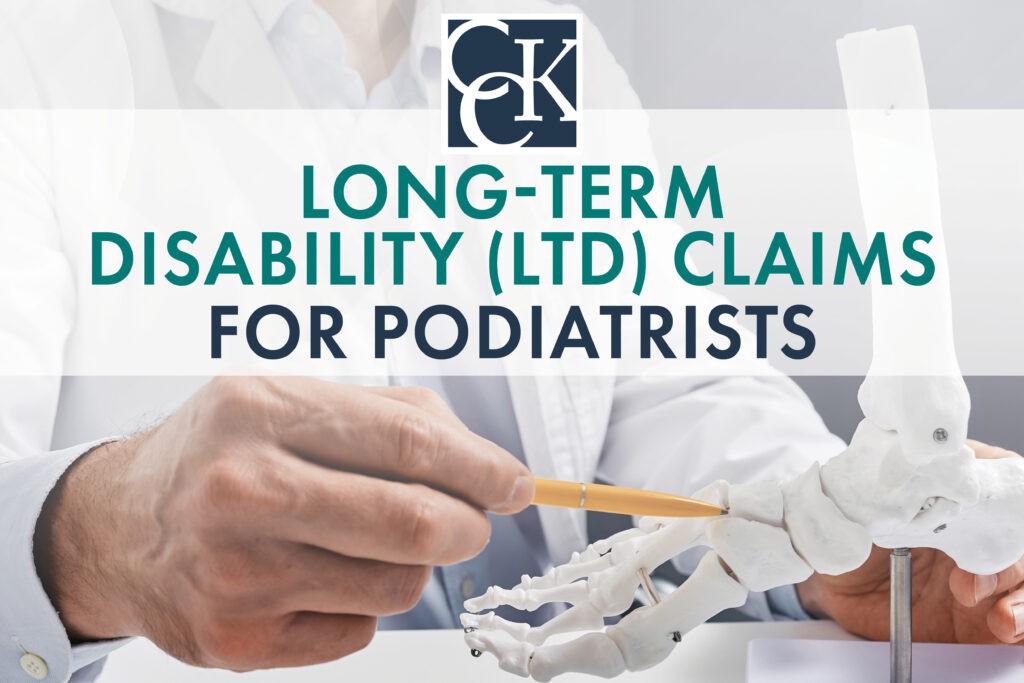Long-Term Disability (LTD) Claims for Podiatrists

Podiatrists are medical professionals who specialize in the treatment of the feet. In many states, podiatrists may also extend their expertise to the ankle. There are around 18,000 podiatrists working in the United States. These valuable members of the medical community provide an essential service to their patients, but what happens when they develop a medical condition that prevents them from working?
Long-term disability (LTD) benefits are vital for all working professionals as these benefits can protect income when a person cannot work. However, filing for and obtaining these benefits is often difficult, yet a podiatrist who finds themselves unable to work due to a disability must consider filing a claim. Consequently, there are several questions a podiatrist may have while filing for these benefits.
Why Would a Podiatrist Need to File for Long-Term Disability Benefits?
When an individual cannot work due to a disability, it is vital that they protect their income. Podiatrists are highly trained individuals, and their work is highly specialized. A podiatrist’s career is built upon their extensive education and experience, but a disabling medical condition can completely sideline their lives and their careers.

In the United States, there are around 61 million people living with a disability. Among the most common are disabilities that affect mobility and conditions that affect the cognitive abilities of a person. A podiatrist whose mobility and cognition are impaired cannot treat their patients at the level they once could and may commit mistakes that could be detrimental to their patients.
A Disability Can Affect a Podiatrist’s Patients
One of the primary reasons a podiatrist would need to file for long-term disability benefits — besides their well-being — is the well-being of their patients. If a podiatrist is struggling to work, they may misdiagnose or mistreat these conditions, which can harm their patients. Unfortunately, a disabling condition can weaken a podiatrist’s ability to carry out the regular duties of their job.
Moreover, podiatrists are qualified to order lab tests, such as blood tests; nail swabs; ultrasounds; X-rays; and MRIs. They must be able to analyze these tests to help their patients. However, a condition that affects their cognitive abilities can make this nearly impossible.
For example, if a podiatrist were suffering from a thyroid issue, such as hypothyroidism, they may experience fatigue; anxiety; muscle weakness; depression; or impaired memory. When analyzing a lab test, they may feel distracted and unable to think clearly. In such situations, they may struggle to understand what afflicts their patient. This inability to work at a high level hurts both the doctor and the patient.
What Type of LTD Policy Does a Podiatrist Usually Have?
Before filing for long-term disability benefits, a podiatrist should first ascertain what type of LTD policy they have. Typically, there are two types: “group policies” and “individual policies.”
Group policies are insurance plans that an employee receives through their employer. Such plans are often part of a benefits package. As such, the employer usually pays some (or all) of the monthly premiums. However, these policies often cannot be modified by the policyholder and are generally more restrictive. Moreover, ERISA — a strict and complex federal law — governs group policies.
Individual policies are insurance plans that a person buys directly from an insurance company. Unlike group policies, these plans are not subject to ERISA. Additionally, policyholders must pay the monthly premiums entirely on their own. Individual policies often allow policyholders more flexibility with their coverage — though usually for an additional cost.

A podiatrist can have either policy. Some podiatrists may have both policies simultaneously. Typically, if a podiatrist owns their own practice, then they will most likely have an individual policy whereas if they work at someone else’s practice or within a hospital, then they most likely will have a group policy.
If you are unsure as to which type of policy you have, it is simple to determine. If you believe you have a group policy, then you can ask your employer directly. Usually, you will contact a member of human resources. You may also receive your plan’s governing documents through your employer.
If you believe you have an individual policy — or are unsure — you can check your financial statements. If you see monthly payments to an insurance company, you should inquire with them directly. Should you have a policy, they will let you know and provide you with your plan’s documents.
What Is the “Definition of Disability” Within a Long-Term Disability Policy?
A long-term disability policy contains a lot of valuable information. This information helps when filing a claim, but it is often hard to understand. One of the most important pieces of information a policy contains is a “definition of disability.”

The definition of disability is what a claimant for LTD benefits must prove to receive an approval. In short, you must submit evidence that proves your disability meets this definition. Typically, there are two types of definitions: “own occupation” and “any occupation.”
The own occupation definition asks whether you can perform the duties of your specific job. For example, does your condition prevent you from performing the material duties of a podiatrist? Some policies will look at how your job is performed in the national economy rather than your specific job with your specific employer.
The any occupation definition, by contrast, asks whether you can perform the duties of any job at all. For example, you may not be able to perform the duties of a podiatrist, but can you perform the duties of another job?
You must collect evidence to support whichever of these definitions your policy contains. Podiatrists are likely to have an “own occupation” definition, which is typically easier to prove. However, it is vital to thoroughly read your policy to confirm which definition you must meet.
Moreover, some policies may transition from an “own occupation” to an “any occupation” definition after a set period — usually 24 months. In such policies, the insurance company will reevaluate your claim to see if your condition meets the new definition.
The Gainful Component in an Any Occupation Policy
Some “any occupation” definitions include a “gainful component.” The gainful component asks whether an individual can still perform the material duties of a job that pays a certain percentage of their pre-disability earnings — usually 60 to 80 percent. This gainful occupation does not need to be related to podiatry, but it will take into consideration a person’s skill set and education.
“Any occupation” policies that contain the gainful component are typically easier to prove than without. If you have an “any occupation” policy that does not include a gainful component, you must show that you are unable to perform any job whatsoever, i.e., that you are completely disabled.
Insurance Companies Will Scrutinize a Podiatrist’s Initial Claim
Insurance companies do not like paying claims. As such, they deny many of them. When you file an initial claim, you must be thorough. Insurers will scrutinize every element of your initial claim. They will attempt to find holes and inconsistencies to use against your claim for benefits. If something is even remotely “questionable” to them, they may issue a denial.
For example, insurance companies hire private investigators to surveil claimants as part of their process. These investigators are looking for anything that can add doubt to your claim. If your claim states “I can never lift anything,” but an investigator sees you lifting groceries, they will cite this as an inconsistency and issue a denial. It is a best practice to be as accurate as possible and avoid “absolute” language when possible unless you truly can “never” do something.
Moreover, insurance companies will routinely require claimants to attend an independent medical exam (IME). These exams, however, are rarely “independent.” Frequently, the doctor who conducts these exams is paid by the insurance company thereby creating a biased opinion. Nevertheless, insurers will use an IME to deny a claim if the doctor conducting it claims you do not need benefits.

The insurance company will look at the material duties of your job when deciding your claim. Often, they use either the Dictionary of Occupational Titles (DOT) or the O*Net Database to determine your duties. However, these resources are not always the most indicative of your profession.
Sometimes the duties listed therein do not cover the scope of what you truly do in your position. Thus, it is important to be thorough in your initial claim and fully describe your daily duties and demonstrate how you can no longer perform them. It is vital to submit evidence that strengthens your claim and demonstrates, fully and accurately, why you require such benefits.
Appealing a Denial of Benefits
Unfortunately, many claims receive denials. If you are a podiatrist, this may feel overwhelming. However, you have the right to appeal the insurance company’s decision.
The administrative appeal stage is the most critical time for your claim. If you have a group policy, this is the last time you may submit new or updated evidence onto the record. Under ERISA, you may not submit evidence if you go to court after this stage.
Since this is a critical stage, it is often advisable to consult an experienced long-term disability lawyer. Some policies allow multiple rounds of appeals, but not all. Your appeal should fix any mistakes present in your initial claim, and it should directly address any specific reasons your insurer cites as part of their decision.
Can You File for Both LTD and SSDI Benefits?
A common question claimants ask is whether they can file a claim for both LTD and Social Security Disability Insurance (SSDI) benefits. Many are eligible for both. Moreover, most insurance companies often require claimants to file for SSDI benefits as part of the LTD process.

In short, insurance companies prioritize their financial needs. As such, if you file a claim for both long-term disability and SSDI benefits, insurers can offset your benefits. For example, you may receive $1,500 per month under your LTD policy and $1,000 under your SSDI policy. Instead of receiving the full $2,500 per month, you would only receive $1,500 as your insurance company will not pay the $1,000 you receive from SSDI.
It is important to note that you may not qualify for both benefits. Just because your condition qualifies you under one policy does not mean it will qualify you for the other.
Call Chisholm Chisholm & Kilpatrick Today for a Free Case Evaluation
If you are a podiatrist who is suffering from a debilitating medical condition that is preventing you from working, you must consider long-term disability benefits. However, these benefits are not always easy to obtain. It is often necessary and beneficial to consult an experienced LTD attorney.
The long-term disability lawyers from Chisholm Chisholm & Kilpatrick have over three decades of collective experience and can help you at any stage of the LTD process. Call us today at (800) 544-9144 for a free case evaluation with a member of our team. We will analyze your case and see if we can help.
About the Author
Share this Post

